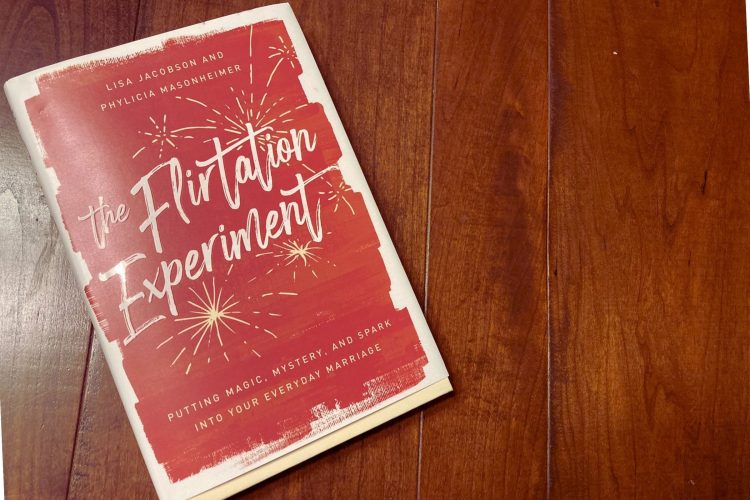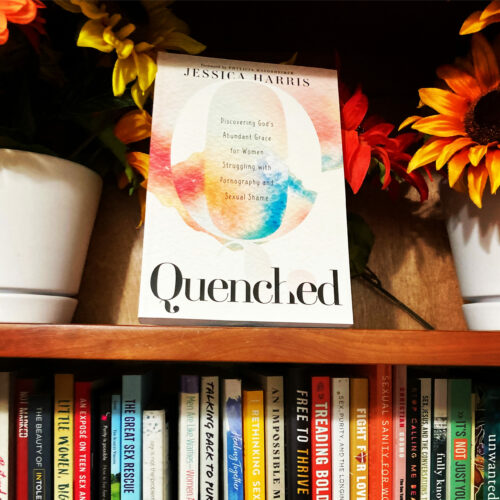“When does the love fade away?”
I was sitting in hair and makeup with Brittni De La Mora, a former porn actress and now leader of XXXchurch and Love Always Ministries. Brittni and I were speaking on a panel for CBN’s Unhooked: Purity in a Pornified World.
It’s not often that I get an opportunity to talk with women in similar places of ministry and life. Brittni and her husband got married in 2016. My husband and I got married in 2018. We each had girls, three months apart. So, sitting in the room with her felt like an opportunity to gain some wisdom.
My husband and I were just over a year into our marriage. We were over-the-moon in love with each other and life as newlyweds and new parents. (In case the timeline is unclear, we were married in September 2018, our daughter was born September 2019 and this story took place in January 2020).
I had always heard about how the fire can fizzle out in marriage. How people fall out of love.
Not us! I thought. We were too in love.
So, I wanted to ask Brittni what she thought.
She paused for a moment, looked at me in the mirror and said, “I think probably around 3-4 years. That’s when we really had to choose to love each other.”
A good friend of mine shared a similar timeline. “Years 3-4 were the hardest for us. I don’t know how we survived them.”
Time and time again I heard that the hard years were coming.
My husband and I have been married for 3 and a half years.
And let me tell you, they weren’t wrong.
My husband is amazing. He’s a phenomenal friend, a great father, a sweet lover, and the list goes on. This is not buyer’s remorse over here. I’m not wishing I had committed to a different model. I know full well the outstanding man of God whose last name I now share.
My husband and I are both children of divorce. My parents didn’t make it a full decade. My husband’s parents made it just shy of two. So we are both very passionate about our marriage not going down that road and doing the work we need to nurture our relationship. And while plenty of experts out there will tell you sex is what makes a marriage work, I can assure you, it is not. Lots of sex doesn’t mean a healthy marriage.
Healthy marriages are built on intimacy.
I have come to realize lately (and by lately, I mean in the last several months) that I struggle with intimacy. Not sexual intimacy but the kind of loving and being loved, knowing and being known that characterizes deep and lasting friendships and relationships.
For thirteen years, I’ve spoken on pornography and its effects on women and their relationships. One of the things I kept hearing other people say was, “Porn addiction is an intimacy disorder.” I always scratched my head at that. I don’t have an intimacy disorder. Speak for yourself.
Well, guess what.
Maybe it’s the two kids two and under. Maybe it’s the stress of writing a book. Maybe it’s the stress of my husband’s job. It’s probably also my own wrestling with my postpartum body, weak and worn, or the two years straight of poor sleep.
Whatever it is, the warm fuzzies have left the chat. Romance tends to take a back seat when you’re scrubbing poop off the wall.
We are in the thick of it here, folks, and the thick of it is ugly and hard. And when things get ugly and hard, I tend to do what I’ve always done best. I retreat into myself. I run. I try to escape. I’m tired and most days are about survival no matter how hard I try to thrive. These days, when my husband comes home from work it’s less the enthusiastic “I’ve missed you, how was your day?” and more the, “Excuse me, you are late for your shift!”
Oh good! You’re home. Here, take the kids. Let me go to the bathroom and have five minutes to think.
For years, I had silently judged people who talked about scheduling sex because life gets too crazy. Suddenly, I was starting to understand them.
For a while, I blamed all the disconnect on my husband. If he just tried harder. Where are my flowers? Where are the love notes? What happened to the romance? Doesn’t he know how hard this is?
But, as time wore on, I realized the hard truth. In typical Enneagram 4 fashion, this was probably my problem more than his.
Right around that time, I heard about this new book The Flirtation Experiment.
Typically, I review resources that have to do specifically with sex or pornography. While this book doesn’t fit neatly in that category, I do recommend it to any married woman out there, regardless of your background, but especially if you struggle with intimacy.
To be clear, I had thrown a couple of books at this problem. Not literally. No books were thrown in our home. But I did encourage my husband to read through a couple books with me in an attempt to rekindle and rediscover the sparkly-eyed zest we had just a year ago.
Every book we read fell short because they made it about sex.
Intimacy is not about sex.
We say it in anti-porn circles all the time and I feel like I need to shout it from the rooftops. Intimacy is not about sex. It’s not and I feel like that’s what every other book I bought missed. They were all about the sex life. If you do this, then it will make the sex better. If you try this then it will improve your sex life.
I didn’t care about our sex life. That’s not to say sex isn’t important, but it is not all there is. I wasn’t concerned so much about our bedroom as I was the rest of our metaphorical house. I cared about our everyday life.
The Flirtation Experiment is about making your “everyday” marriage better.
The book for wives is co-authored by two women: Lisa Jacobson and Phylicia Masonheimer. Many of you may actually know Phylicia or have heard of her. A struggle with erotica is part of Phylicia’s story and she writes occasionally about lust and the Christian woman.
I read this book, and I have to say, it was exactly what I needed and wanted at this stage in my marriage.
From the intro, I knew I was on the right track. Phylicia shares about a similar time in her marriage. She felt her relationship with Josh, her husband, was similar to coworkers instead of lovers. I resonated with that.
The Flirtation Experiment is, essentially, thirty experiments on how to reconnect with your spouse. It’s not about sex, but about friendship, intimacy, and fun. Lisa and Phylicia take turns sharing an attribute of love along with an accompanying experiment. From day 1, I was hooked and honestly looked forward to what the next day’s challenge would be.
This book is responsible for some love notes, some kissy-face notecards, a couple extra candy purchases, some great conversations, and a date away later this month just so we can get some sleep. I am not exaggerating when I say we haven’t slept through the night in over two years. Other challenges seemed to be orchestrated perfectly. The challenge about comfort came at a time when we suddenly lost a friend and my husband had to begin planning his funeral. The challenge about kindness came on a day when my husband unexpectedly got delayed at work (which is always a point of frustration for me).
I will say I enjoyed Phylicia’s chapters more than Lisa’s. It may be perhaps because she is in a similar stage of life or because I identify with so many of the struggles she shares. She would share about a situation in her marriage, and I would think to myself, “Oh my goodness! I’ve done that to!!”
I have totally angry-washed the dishes. When I’m mad, our house is spotless. Then when he tries to clean the house, I assume he is mad.
I have absolutely struggled to be vulnerable with my husband expecting him to somehow navigate the maze that is me.
Wrestling with pride, fear, jealousy? Check. Check. Check!
Phylicia’s chapters always felt like the gentle correction of a sister in Christ.
The kick in the pants I needed to pull my head out of the sand and realize that my heart might be the culprit behind many of these issues.
While Phylicia’s felt like a “challenge,” Lisa’s felt more like an “inspirational reflection.” Her chapters didn’t seem as confrontational and problem-solving as Phylicia’s were. I struggled to resonate with her chapters because they felt impractical and “fluffy” sometimes.
Still, overall, I loved the book. I loved it so much that I repeated days 1-5 before moving on to day 6. I found it fun and convicting. It challenged me to uproot areas of bitterness, apathy, and pride in my own heart and life, instead of hoisting all the blame on my husband and pretending like the problem was he didn’t buy me flowers.
I did buy the workbook but ended up abandoning it after day 5. I didn’t find it helpful as I already am crunched on time as it is.
If you are a married woman who is looking to add a little zest back into your marriage (outside of the bedroom), I want to encourage you to read it.
If you are a married woman who has struggled with pornography, fantasy, erotica or some other threat to intimacy, I want to challenge you to read it.
I am realizing intimacy isn’t something that just happens.
It has to be cultivated. Intimacy has to be nurtured and tended to and I, for one, struggle with that. My personality is very much one to find the best system and optimize it as much as I can. You cannot convert marriage into an optimized system. There is brokenness and depth that takes intention and effort. Marriage isn’t two robots, but two people, with hopes, dreams, ambitions, desires, failures, stressors, and needs.
Lest you think this book magically changed me, I assure you it did not.
When my husband stumbled upon my copy at the end of week 1 and mentioned it, I pitched a fit. I sulked and complained and got all passive aggressive and told him he ruined it and that now I didn’t even want to do it anymore because he had taken all of the fun out of it… see? not his problem. And now I know where our toddler gets it.
I still have some work to do. I’ll be the first to tell you that, but I am planning on repeating this book again and again so I can continue to grow. I finished it a week ago and already feel like I need to start it again.
Love looks different now than it did in those early days. It looks like stretch marks and bags under our eyes and cleaning up Cheerios off the floor. It looks like a hug and a kiss while our toddler tries to pry us apart (she thinks it’s a game). It looks like saving the meaningful conversation for later because the babies are screaming.
Intimacy looks less like running off to the bedroom together and more like catching each other’s eye and smiling as we scrub the carpet for the third afternoon in a row.
It looks more like commitment, covenant, and choice. It looks less like “natural” and more like “intentional” and that, I’ve found, is a very hard, very humbling, but very good thing.






